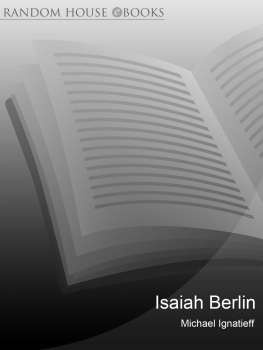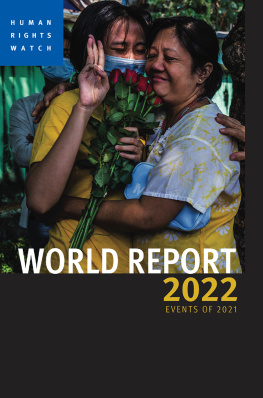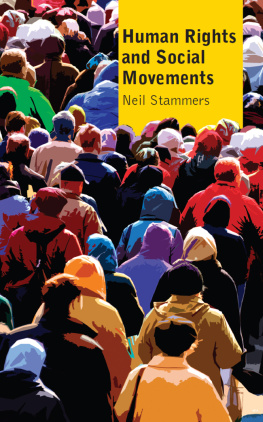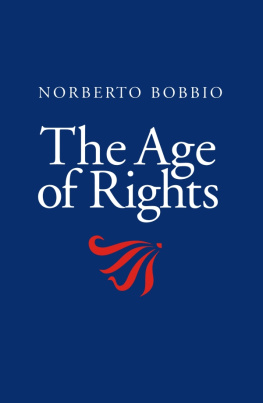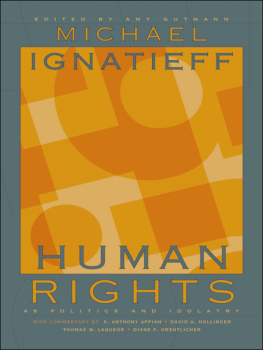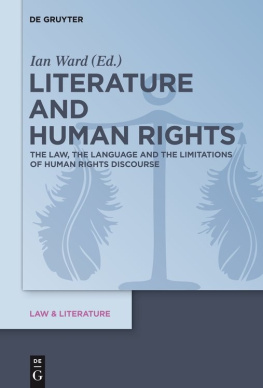ALSO BY MICHAEL IGNATIEFF
NONFICTION
A Just Measure of Pain
The Needs of Strangers
The Russian Album
Blood and Belonging: Journeys into the New Nationalism
The Warriors Honour: Ethnic War and the Modern Conscience
Isaiah Berlin: A Life
Virtual War: Kosovo and Beyond
Human Rights as Politics and Idolatry
Empire Lite: Nation-Building in Bosnia, Kosovo, Afghanistan
The Lesser Evil: Political Ethics in an Age of Terror
American Exceptionalism and Human Rights
True Patriot Love
FICTION
Asya
Scar Tissue
Charlie Johnson in the Flames
MICHAEL IGNATIEFF
THE
RIGHTS REVOLUTION

Copyright 2000, 2007 Michael Ignatieff and the Canadian Broadcasting Corporation
All rights reserved. No part of this publication may be
reproduced or transmitted in any form or by any means,
electronic or mechanical, including photocopying, recording,
or any information storage and retrieval system, without
permission in writing from the publisher.
Distribution of this electronic edition via the Internet or
any other means without the permission of the publisher is
illegal. Please do not participate in electronic piracy of
copyrighted material; purchase only authorized electronic
editions. We appreciate your support of the author's rights.
This edition published in 2009 by
House of Anansi Press Inc.
110 Spadina Ave., Suite 801
Toronto, ON, M5V 2K4
Tel. 416-363-4343
Fax 416-363-1017
www.anansi.ca
LIBRARY AND ARCHIVES CANADA CATALOGUING IN PUBLICATION
Ignatieff, Michael
The rights revolution / Michael Ignatieff. 2nd ed.
Includes bibliographical references and index.
eISBN 978-0-88784-892-6
1. Civil Rights Canada. 2. French language Quebec (Province).
3. Language policy Canada. 4. Indians of North America Canada Claims.
5. Indians of North America Canada Land tenure.
I. Title.
JC599.C3146 2007 323.0971 C2006-904288-8
Cover design: Bill Douglas at The Bang
Cover photograph: David Levenson/Getty Images

We acknowledge for their financial support of our publishing program the Canada Council for the Arts, the Ontario Arts Council, and the Government of Canada through the Canada Book Fund.
For S. Z.
as always
PREFACE
WHEN I FIRST DELIVERED these Massey Lectures on CBC Radio in 2000, I was a professor at Harvard University. Looking back now, I can see that The Rights Revolution began the process that led to my entering public life here at home in 2005. Like every Canadian, I carry within me a certain idea of Canada. This book outlines that idea.
As Canadians, we have managed to create a single political community of equal citizens out of Aboriginal peoples, francophones, anglophones, and all the people like me whose families came here as emigrants from other countries. Out of those different languages, traditions, and cultures, we have forged a political system that holds us together and keeps us talking through our differences peacefully. We have also succeeded in maintaining a distinctive culture and a tradition of proud independence next door to the most powerful state in the world. All of this is no mean feat.
Canadas political achievement is important. The worlds deepest problem is not climate change or the supposed clash of civilizations or inequality between rich nations and poor ones as important as these problems are. The fundamental problem facing humanity is political: how to create stable political order among people of different religions, cultures, and economic classes. As long as states can cohere as viable political communities, all their problems can be managed. But if they cannot maintain order and freedom, they cannot solve any of them. Here Canada has shown the way: maintaining freedom among peoples who value their differences yet desire to live as equals in a political community.
Being Canadian, we do not shout our achievement from the rooftops. We know we still have a long way to go before the achievement is complete. Many of our people do not share in the promise of Canadian life; many of our regions feel left out of our prosperity; our national unity is a permanent work-in-progress. But we know what we have to do. The rights enshrined in our Charter of Rights and Freedoms exhort us all to narrow the gap between the Canada we actually live in and the Canada we know we can build together.
Other countries have also managed to maintain successful political communities. What makes Canadas achievement distinctive? While all modern democracies protect rights, our system is special in the way it reconciles individual and group rights. Both our provincial and federal charters protect group rights to language in order to guarantee the preservation of the French fact in North America. These charters also protect the treaty and Aboriginal rights of our First Nations, Inuit, and Metis peoples. Reconciling group and individual rights is not easy. Canadians want both their equality recognized and their differences respected. They want to be acknowledged as equal individuals and as members of communities. Recognition of equality points one way; recognition of difference can point another. Moreover, while all communities in Canada should be equal, not all communities are the same. Aboriginal Canadians claim the status of first nations, in recognition of the fact that they maintained political order before European settlement. The Qubcois see themselves as a national group within Canada, in recognition of their distinctive language and history as a French colony. There is no reason in principle why acknowledging the national character of certain communities in Canada should put the unity of the whole at risk. We have been working at reconciling these competing principles since Confederation, and while constitutional reconciliation of equality and difference remains elusive, our arguments have not broken up our country. Indeed, we have become a model for the world of how to balance majority and minority interests and how to maintain the unity of a complex federation. Our vocation in the world is to help other countries deepen and develop their citizenship as we have deepened and developed our own. Just as we seek to promote peace, order and good government at home, we should seek to do the same abroad.
We have also established the most progressive political culture in the Americas. Our laws protect the equality rights of all Canadians regardless of sexual orientation, including rights to marriage. Our laws guarantee a womans right to choose. The Canada Health Act commits the federal and provincial governments to guarantee equal rights of access to health for all citizens. Our constitution commits the federal government to use its authority and spending power to maintain rough equality of services among all regions and among all citizens. There are some other distinguishing marks as well. Unlike the United States, Canada does not recognize a constitutional right to bear arms. Canada does not practise capital punishment. In these and other ways, our rights culture entrenches our national identity as a progressive people.
Maintaining these commitments is not easy. There is no stable political consensus in favour of them. It takes political leadership to articulate why these values matter, and why we need to make sacrifices in order to keep them flourishing. It is also the work of political leaders to hammer out compromises when the rights and interests of competing groups conflict. Active engagement in politics by citizens and by leaders is essential if we are to maintain our distinctiveness as a progressive people and to find the compromises that keep us together.
Next page



